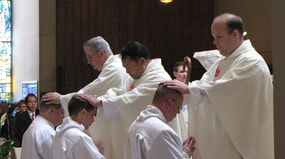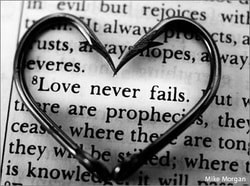|
When he broke open the fifth seal, I saw underneath the altar the souls of those who had been slaughtered because of the witness they bore to the word of God. They cried out in a loud voice, "How long will it be, holy and true master, before you sit in judgement and avenge our blood on the inhabitants of the earth?"
(Revelation 6:9-10) As Christians, we are tasked with following the teachings of Christ over those of the world. Doing so often puts us at odds with the latter, amid accusations of fostering inequality, forcing our beliefs on others, adhering to obsolete traditions, or getting involved in matters that do not concern the Church. It’s true that there have been many efforts over the centuries to silence Christians—persecution is nothing new to the Church—but Jesus had warned that believing in Him would not make us popular in the eyes of the world (John 15:18, c.f. 1 John 3:13, 2 Timothy 3:12, 2 Corinthians 4:8-11, Revelation 2:10). The most recent evidence of persecution can be seen in the ongoing ISIS attacks in the Middle East, where people who have been living in areas that have been Christian for nearly 2,000 years are suddenly being forced to convert or die. Though this grave situation is happening half a world away, it is critical that we do not remain apathetic during our daily routines. Cardinal Donald Wuerl of Washington, D.C., in his closing remarks at The Catholic University of America’s Mass of the Holy Spirit, warned that human atrocities can occur if people remain silent about the plight of others. As Christians, we are all united in the body of Christ through our baptism (see 1 Corinthians 12:12-26, c.f. Romans 12:15) and as such, we must care about what affects another member. To that end, Saint Paul writes, “If one member suffers, all suffer together; if one member is honored, all rejoice together.” While it is easy to forget the persecution occurring beyond our borders in our comfortable day-to-day activities, we cannot simply be sorry for the terrible suffering endured by others—these are truly our brothers and sisters in the faith who need our continuous compassion and support! We may not be able to fully imagine the terror they are experiencing but we can at the very least offer prayers and sacrifices (i.e. suffer with them) on their behalf. Never doubt the value of prayer. It remains a most powerful means of comfort, hope, and strength from and in God. Pope Francis has stressed that “prayer, in the face of a problem, a difficult situation, a calamity…is opening the door to the Lord, so that He can do something. If we close the door, God can do nothing!” When we offer our prayers, we are also expressing our trust that God is more powerful than the problems presented by the world—He can bring good out of evil—as we read of many biblical miracles when God’s people prayed for deliverance and forgiveness. When we pray, we remember the needs and welfare of our brothers and sisters in the faith and become united through our communication with God. With sincerity and reverence, the words spoken aloud or in one’s mind and heart are infinitely more effective than simply pitying the plights of others. In spite of all the terrors and injustices reported to and/or experienced by us each day, let us never forget to hope! Suffering is indeed a part of life, but by the Passion and death of Christ, salvation for the world has been achieved. We can take comfort and rejoice that our own suffering can be joined with His and offered up as gratitude for His willing Sacrifice: because of His subsequent resurrection, we too can look forward to being raised. What will separate us from the love of Christ? Will anguish, or distress, or persecution, or famine, or nakedness, or peril, or the sword? As it is written: "For your sake, we are being slain all the day; we are looked upon as sheep to be slaughtered." no, in all these things we conquer overwhelmingly through him who loved us. For I am convinced that neither death, nor life, nor angels, nor principalities, nor present things, nor future things, nor powers, nor height, nor depth, nor any other creature will be able to separate us from the love of God in Christ Jesus our Lord. (Romans 8:35-39) Thomas Wong is an undergraduate student at The Catholic University of America and a member of the Catholic University Knights of Columbus.
0 Comments
“So have you thought about becoming a priest?” As an altar server in my parish, many a priest (and well-meaning parishioner) would ask me this question as we were preparing for the celebration of Holy Mass. Even though this would stem from a casual conversation about my life, I was always somewhat taken aback by the harmless question put to me in that sacristy before I would automatically answer back to the smiling celebrant, “If God wills it!” To be honest, however, I felt lost. Some days I would think that being a priest was my calling, others that having a family was. In my life I would see hints of my calling everywhere— a Bible verse (i.e. Matthew 9:37) would tell me to be a priest while a smiling baby (and the occasional girl) would inspire me to be a dad. These mixed signals distressed me: despite my prayers, it seemed as if I would never get a firm answer to the life-changing question of what God wanted of me.
While I consider Saint Joseph my go-to-man for guidance on paternity, I look to Saint John Vianney, the patron of priests, for all matters concerning the Roman collar. The so-called “Curé of Ars” is an especially good model of strong will for both those preparing for the priesthood and anyone discerning God’s calling. From his youth he was filled with a great desire to “win souls for the good of God” by being a priest, though the turmoil of the French Revolution, having difficulty learning and memorizing in school, his father’s reluctance to not having him assist in the fields, being drafted into the military, suffering sickness, living amidst the government’s anti-Catholic persecution, and even being dismissed from the seminary in Lyon all stood in between the French man and his calling. At the age of 29, however, John Vianney was finally ordained, and he began to tend to the priestly and pastoral work in his parish. The same perseverance that enabled him to become a priest was now applied to the preparation of sermons, reflection on the works of spiritual writers and theologians, devotion to the Blessed Virgin Mary and Saint Philomena, self-mortification, and ministering through Eucharistic Adoration and the sacrament of Reconciliation. What an example of courage for those who today experience the grace of being called to the priesthood! With my own discernment process ongoing, I must remember that, despite the mixed signals I’m receiving as to what I am being called for, my vocation is not a problem to be solved! Rather, it is a personal call to holiness, one of joy and love. To worry excessively over this is to not allow God to work freely in my life nor trust that He will never lead me down the wrong path! Of course, the priesthood is not for everyone— fervent discernment will help determine if God is in fact calling a man to be consecrated in this way. Entering into a seminary is itself not a final decision but the best way to discover the authenticity of one’s vocation. Of course, the discernment process can also be started by simply conversing with a priest! In the Catholic Church, the role of the priest is vital. Tasked with the spiritual welfare of his flock, a priest is responsible for, but not limited to, celebrating daily Mass, administering the sacraments, offering counsel and comfort, leading retreats, catechizing, volunteering, and helping to run the parish community. He must be sensitive to the needs of his assignment while remaining obedient to the Church hierarchy. In addition, being a priest requires a 24/7 commitment with very little financial compensation;however, the reward for doing so— which is similarly offered to us all— is infinitely more fulfilling than a paycheck. In short, the priest is the mediator between God and His people. Just as Christ was sent by the Father, He in turn sent the Apostles into the world, so that “through them and their successors, the Bishops, He might continue to exercise His office of Teacher, Priest, and Shepherd… they are called to the service of the people of God” (Pope Francis’ homily given on Good Shepherd Sunday 2013, c.f. John 20:21-23). John Vianney similarly recognized the significant of the priesthood: “Oh, how great is a priest! The priest will not understand the greatness of his office till he is in Heaven. If he understood it on earth, he would die, not of fear, but of love.” Through the priest, we can glimpse the immense Love and grandeur of God: it is through him that Christ forgives our sins and through him that we receive the Body and Blood of our Lord. As I continue to discern my calling, I am reminded of all the priests God has placed in my life. These brave, holy, good, and faithful men of God have inspired me greatly with their joy, goodwill, patience, humility, and generosity in passing on the teachings of the Faith and caring for others. Like their patron, they trust in God to help them persevere through times of hardship and distress. They have readily answered God’s call of “Whom shall I send?” (Isaiah 6:8) and dedicated themselves to serving us through the example of Christ. They continuously pray for us; we must do the same for them! We are here today thanks to them. Thomas Wong is an undergraduate at The Catholic University of America in Washington, D.C. “Lead me in your justice, Lord” is the response from today’s responsorial psalm. It is a fitting tie-in, as we are days away from the conclusion of the Fortnight for Freedom, an effort sponsored by the United States Conference of Catholic Bishops to encourage all U.S. Catholics to not only recognize the freedom we already enjoy as citizens but to also recognize that there is still progress to be made.
Yesterday, a crucial step was taken towards the protection of religious liberty in the United States, as the Supreme Court released its decision in what has been known as the “Hobby Lobby” case. The court ruled yesterday that “closely held,” for-profit, corporations have the ability to opt out of the Department of Health and Human Services contraception mandate which was instituted as part of the Affordable Healthcare Act. This ruling protects the rights of private citizens to follow their religious beliefs and not be forced to violate them in their businesses. In a sense, this is exactly what the Fortnight for Freedom is all about, and it is appropriate that the decision was released in the middle of this Fortnight. The focus on religious liberty can often get lost in the heavily politicized nature of these debates. Many people forget that contraception is not the heart of the issue, but rather protecting the right of employers and religious institutions to follow their own beliefs. This is a polarizing issue, one which many people have strong opinions on. We hear the cry of religious liberty constantly and while it is imperative to continue the fight for this religious liberty, we as Catholics must remember that we are working to defend our right to make these important (and often controversial) decisions ourselves, through our own faith-formed conscience. The conclusion of the Fortnight for Freedom will be on July 4th, Independence Day. This is a time for us as a nation to come together to celebrate the country that we live in, imperfect as we often may be. We must remember the news reports which are filled with stories of religious persecution and humanitarian tragedies, and recall that we are blessed to enjoy the freedom we do have, the freedom that is one of the principles that this country was founded on. During these last few days of the Fortnight for Freedom, take some time to recognize what freedoms you are especially grateful for, and take a moment to pray the Prayer for the Protection of Religious Liberty: O God our Creator, from your provident hand we have received our right to life, liberty, and the pursuit of happiness. You have called us as your people and given us the right and the duty to worship you, the only true God, and your Son, Jesus Christ. Through the power and working of your Holy Spirit, you call us to live out our faith in the midst of the world, bringing the light and the saving truth of the Gospel to every corner of society. We ask you to bless us in our vigilance for the gift of religious liberty. Give us the strength of mind and heart to readily defend our freedoms when they are threatened; give us courage in making our voices heard on behalf of the rights of your Church and the freedom of conscience of all people of faith. Grant, we pray, O heavenly Father, a clear and united voice to all your sons and daughters gathered in your Church in this decisive hour in the history of our nation, so that, with every trial withstood and every danger overcome-- for the sake of our children, our grandchildren, and all who come after us-- this great land will always be "one nation, under God, indivisible, with liberty and justice for all." We ask this through Christ our Lord. Amen. Rebecca Ruesch is the Blog Editor for the Catholic Apostolate Center This Sunday’s gospel from Matthew asks us to love not only our neighbor, but our enemy as well. It says:
“You have heard that it was said, 'You shall love your neighbor and hate your enemy. But I say to you, love your enemies and pray for those who persecute you.’” It is easy to hate those who cause us pain, but God calls us to love them instead, to demonstrate the perfect love that He shows us. As children we are always told to treat others with kindness and respect, and loving those who we do not like is a challenge that continues throughout our lives. How do we turn the other cheek? Jesus says, “Offer no resistance to the one who is evil” “Should anyone press you into service for one mile, go for two miles.” God asks us to embrace the challenges of our enemies and instead of responding with hate respond with the love He shows us. He points out that many of our enemies are not so different from us, “For if you love those who love you, what recompense will you have? Do not the tax collectors do the same? And if you greet your brothers only, what is unusual about that? Do not the pagans do the same? So be perfect, just as your heavenly Father is perfect.” How can we translate this to our everyday life and what is the benefit? Find an “enemy” a rival in a class, a competitive sibling, a disgruntled roommate. It is easy to respond to their negativity or the feeling that they are persecuting you with equal hatred or unpleasantness. But, this benefits no one. If we instead respond with peace and love, we stop a cycle of hatred and persecution and show to them the love the God shows to us. This furthers peace throughout the world and within our society, it has the power to solve great conflict and bring the smallest bit of happiness to someone. God’s love is perfect and can only be achieved and spread if we his children are actively working to spread it, and if we are at the same time resisting the urge to respond to hatred with hatred. The beginning of this week’s gospel references the “Eye for an eye” form of justice in society, and it asks us to rise above this need to get even and bring about change through not just acceptance of our enemies, but love of them. Eileen Welch is Regent of Catholic Daughters of the Americas Court #2646 at the Catholic University of America. "For already at the beginning of their lives they pass on. The end of the present life is for them the beginning of glory. These then, whom Herod's cruelty tore as sucklings from their mothers' bosom, are justly hailed as "infant martyr flowers"; they were the Church's first blossoms, matured by the frost of persecution during the cold winter of unbelief." St. Augustine
Twinkling lights adorn front porches; snowflakes fall softly to the earth; jingle bells sound from every street corner; and children’s voices sing praise in memory of the Savior’s birth as Christmas comes bustling into our lives. And as I watch and listen, I’m reminded that there are many voices that won’t be joining that chorus, at least not audibly. Christmas is one of my favorite times of year, but it also brings much sadness along with it as I remember my little brother who once again will not be joining us to celebrate this joyous feast. This pain is manifested in a deep way as much joy is to be shared by many. I don’t always associate Christmas as a time to bear my cross and follow Christ; after all, this is a joyous occasion. It’s a time to celebrate Jesus’ birth, not to mourn his death. This year I can’t help but think of the cross as I find myself remembering the deep sorrow and loneliness of losing someone so dear to me. Questions flood my mind of why my little brother, so innocent and so little, had to suffer stillbirth and die. As I reflect on this experience of powerlessness, I am reminded of those mothers who two thousand years ago lost their sons as Herod viciously sought to destroy Jesus. During the Christmas Season, our Church has a beautiful tradition of honoring those early martyrs, the Holy Innocents. Just as my own parents were devastated at the loss of my brother, I know that these mothers and fathers, too, felt the almost unbearable sorrow and sense of helplessness of losing a child. This senseless loss is my cross, as I can imagine it is a struggle for anyone who has lost a loved one, and yet Jesus doesn’t leave me alone for long. Words of St. Augustine come rushing into my head, comforting me: “For almighty God…because he is supremely good, would never allow any evil whatsoever to exist in his works if he were not so all-powerful and good as to cause good to emerge from evil itself.”[1] Hope. Reassurance. The cycle of death and life revealed. And then I realize why Christmas is so dear to me. Christmas manifests the time to celebrate life and to remember that good is ever being born into this world. Through his Beloved Son, God lovingly demonstrates His desire for good to triumph. As St. Augustine reminded me, God not only desires good but God always brings good out of evil situations, even though we might not always recognize it. My mind is amazed as I ponder the mystery of the Incarnation. Gratitude fills my heart as I feel Christ with me a midst my joy and my sorrow. The beautiful gift of a child, of the God incarnate, sent to us to share in our life and to bring good out of evil in a truly personal way. Church bells ring; incense lifts gracefully to the heavens; angels proclaim Good News of great joy; the Body of Christ is broken and shared; and I know in my heart that my little brother lives. Amy Winkler serves as an Echo Faith Formation Apprentice in the Diocese of Camden, NJ [1] St. Augustine, Enchiridion, 3, 11; PL 40, 236 as cited in CCC #312. |
Details
Archives
July 2024
Categories
All
|
About |
Media |
© COPYRIGHT 2024 | ALL RIGHTS RESERVED





 RSS Feed
RSS Feed